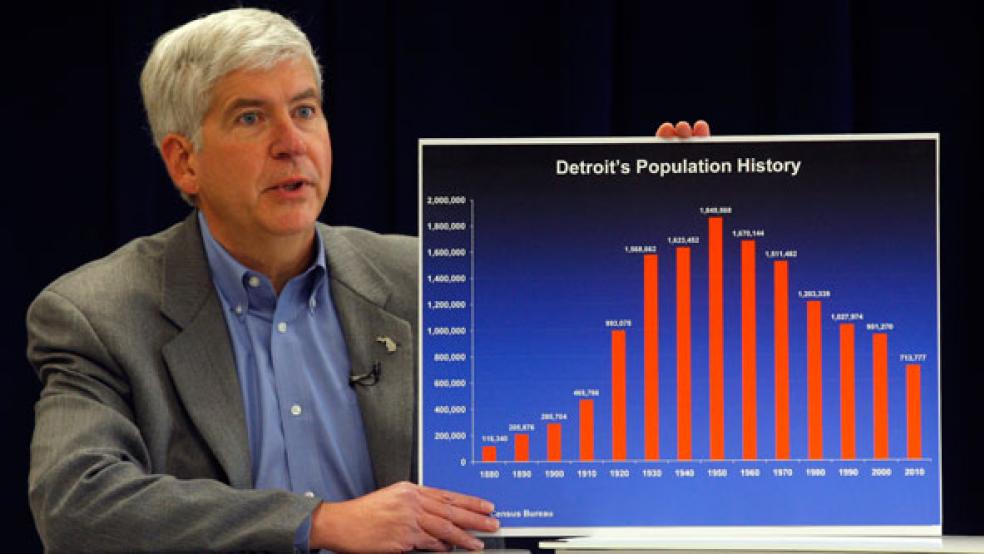Michigan Governor Rick Snyder is expected to announce on Thursday an emergency state takeover of Detroit, putting a lawyer with extensive experience managing corporate bankruptcies in charge of the destitute city's finances.
The dramatic move will culminate the long decline of the once thriving center of the U.S. auto industry and birthplace of the Motown music scene. Republican Snyder is "highly likely" to name an emergency financial manager for Detroit at a news conference scheduled for 2 p.m. local time on Thursday, a source with direct knowledge of the decision said.
RELATED: Detroit's Big Dig: Will Urban Farming Get Them Out of the Hole?
The top candidate for the job is Kevyn Orr, 54, a partner in the Washington, D.C., law firm Jones Day, who has long experience handling corporate bankruptcy and restructuring cases, said another source with direct knowledge of the choice. Orr is best known for his work on the restructuring of Michigan-based Chrysler, which filed for bankruptcy in 2009, earning $1 million in fees during the first year of the case.
He has other Michigan ties, having received both graduate and law degrees from the University of Michigan. And he is African-American, which some politicians have said could help him deal with community leaders in a city that is 83 percent black.
Orr did not return calls and emails requesting comment. Snyder also declined to comment.
The emergency manager will face the huge and controversial task of repairing the finances of a city in crisis. Detroit has run operating deficits for nearly a decade, is starved of cash and facing a crushing burden of debt from commitments such as pensions and health insurance.
Detroit is the poorest major city in the United States with more than a third of the population officially classified as living in poverty, and it has an unemployment rate of 18.2 percent compared with a national rate of 7.7 percent, according to government figures.
Basic services such as street lights and police protection have broken down, and the city has suffered from mismanagement and political corruption.
Detroit's mayor for seven years until 2008, Kwame Kilpatrick, was convicted this week of two dozen federal charges of corruption and bribery for a scheme to collect kickbacks on city contracts for himself and associates. He could face up to 20 years in prison on some of the charges.
Detroit city leaders have long opposed a state takeover, saying that they were making progress on improving the financial situation. Mayor Dave Bing, a former professional basketball player and steel executive, last week announced that it was futile to resist a state takeover, and he would try to work with the emergency manager.
But a defiant city council has called on residents to fight the move, saying that the state is usurping the right of Detroit residents to elect their own leaders.
"We fought for everything we have. How do you stand on the sidelines," Councilman Kwame Kenyatta said on Wednesday in a fiery speech on civil rights at a council meeting. The city could challenge the takeover in state court, but such attempts have failed in Michigan in the past.
Under Michigan state law, the financial manager will have broad powers to run the city, supplanting the elected city council and mayor. The manager could ultimately recommend that Detroit file the largest municipal bankruptcy in U.S. history. The manager will be able to renegotiate labor contracts, privatize services and sell certain city assets. A law passed in December 2012 that takes effect on March 28 will boost those powers, allowing the manager to terminate collective bargaining agreements with the city's 48 unions.
This article is by Steve Neavling of Reuters; additional reporting by Dawson Bell in Lansing, Michigan, and Karen Pierog in Chicago.




